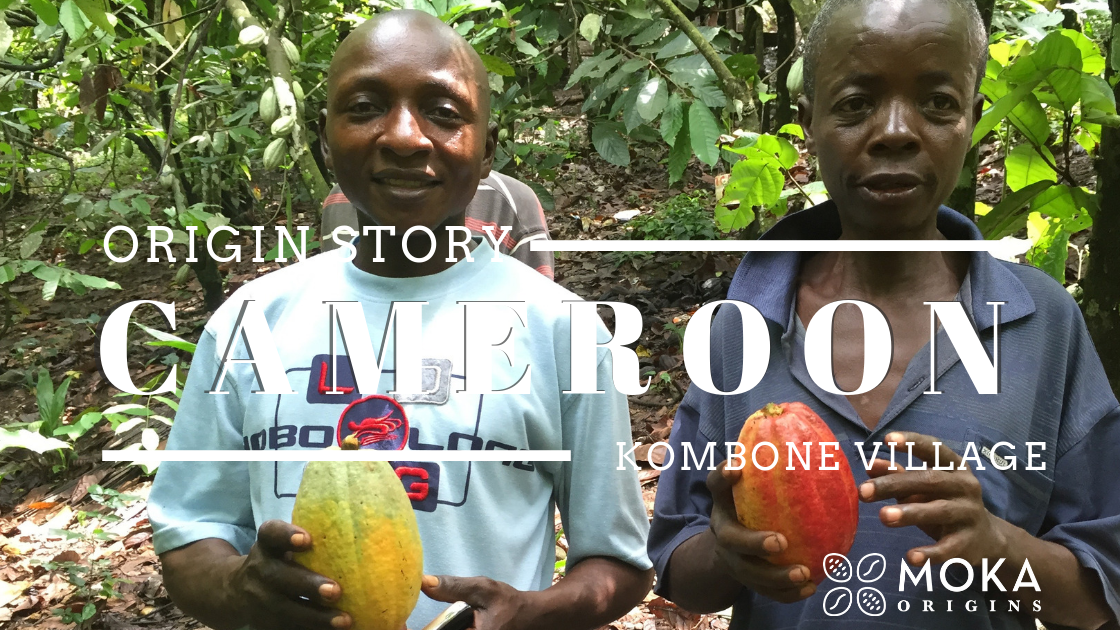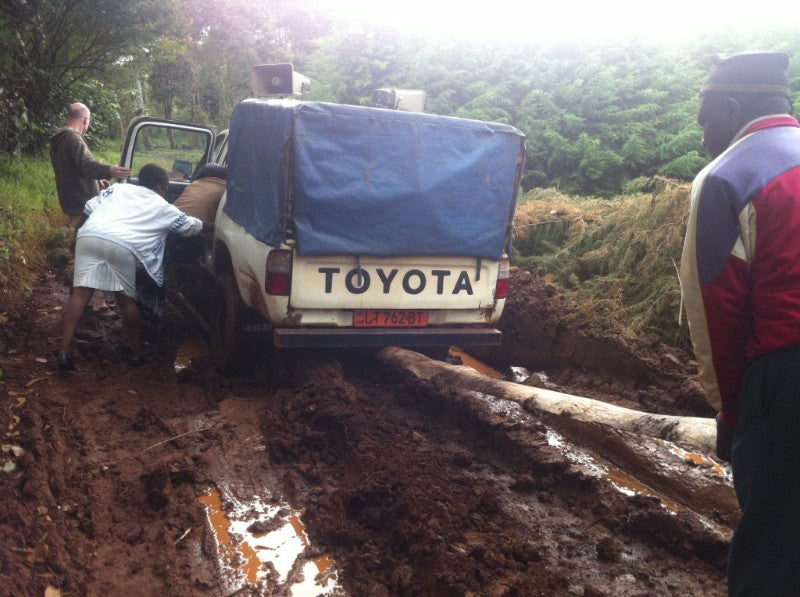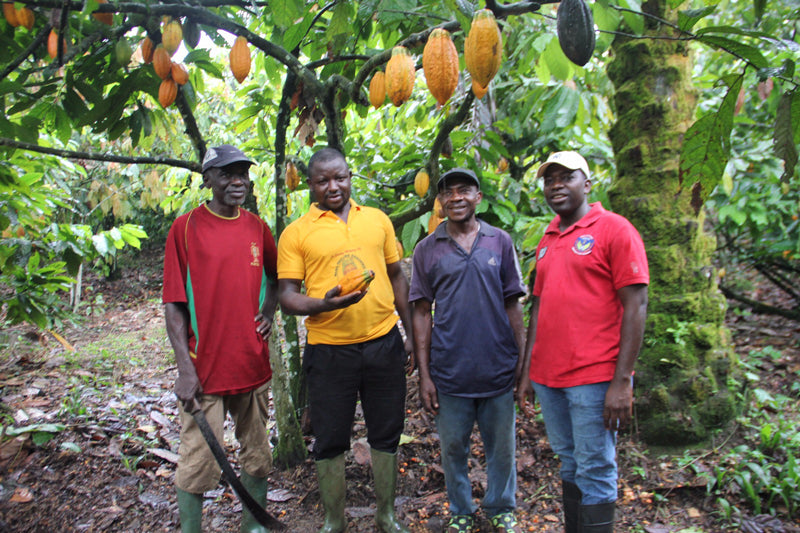
Cameroon, Africa has been at the heart of our mission since day one. After undertaking educational-based humanitarian projects for over a decade, Moka founders, Ishan and Jeff, started a farming social venture in Cameroon. This was done with the intention of supporting job development and sustainable farming practices in the region. A few years later, we opened a specialty coffee and bean-to-bar chocolate lab in Honesdale PA. Moka Origins was officially in production.
"Our mission is to help farmers realize the fullest potential of their farms and introduce their amazing west African beans to the world. By exposing Africa's brighter-side and directly investing back into Africa, we hope to fuel further social development." -Jeff Abella

It's taken a decade of hard work in Cameroon and extreme dedication to understanding it's complex work environment, but we're excited to finally introduce America to the first Bean-to-Bar chocolate to come from South West Cameroon, and its nothing like you ever tasted before.

Experience this bar now exclusively through Moka Box.
The Story Behind the Bar
Cameroon's southern rainforest is known for its lush and humid growing environment, which creates an ideal growing condition for great quality cacao. This forest is also home to thousands of animal, bird and plant species. The dense vegetation creates the perfect shaded environment to protect cacao trees from the harsh sunlight, and the wet conditions allows the cacao to flourish in the area. With large changes in elevation, cacao is often grown in deep valleys, coupled with some of the most nutrient dense soil on the planet. These conditions allow the crop to create unique and complex flavors special to this region.
Within this region there are hundreds of farmers that grow cacao, many of which the Moka Origins team has gotten to know through years of humanitarian projects through the Himalayan Institute. One of these farmers is named Stanley Ngoe.

Stanley was born and raised by a cacao farmer and grew up his entire life learning the trade and lifestyle that comes with cacao farming. When he was only 21, his father passed away, leaving Stanley responsible for his family and the family farm. Embracing this course of life, Stanley took on cacao farming full-time, and continued to produce some of the best cacao beans in the area. As Stanley knows, there are two main post-harvest steps on the farm that guide flavor: Fermentation and drying. Fermentation can take up to 7 days and is essential for developing rich and complex flavors, and drying is equally as important, because if done improperly can create mold and flavor contamination. The art of fermentation and proper drying, which is essential to producing high-quality flavor profiles, was originally taught to him by his father, and Stanley continues to follow in his family lineage by keeping these critical steps in the forefront of his bean production.

Unfortunately for Stanley and many other farmers in the region, much of West-Africa today has a bad reputation for its cacao, which leaves farmers like Stanley in a difficult position to continue producing and selling quality beans. Due to the regions reputation for poor post-harvest practices, poor infrastructure, and stories revolving around slave labor, West-Africa is largely overlooked in the world of specialty chocolate makers. Our mission was born in Cameroon, and our mission is to bring the best flavors of this region to the world. High-quality ethically sourced beans from West Africa do exist, and currently need education, investment, and refinement in the process to allow them to come out. A prime example of a socially conscious Direct-Trade cacao from Africa is Dandelion Chocolate and their Gola Rainforest bar.

Most of the farmers also face logistical challenges. For example, within 12 hours after cacao is harvested it needs to undergo a long fermentation period followed by proper drying. Since proper indoor processing facilities don’t exist to most farmers, they are left to dry their beans outside using the sun during the rainy season. Altogether, this creates a long time for farmers to wait to sell their beans, especially when they are relying on big commodity brokers to buy their beans who do not insist on high quality, properly fermented, or thoroughly dried cacao. As you can imagine, this eventually trains farms away from proper post-harvest practices, ultimately reducing the quality of the cocoa coming from this region. It gives a bad reputation to otherwise great potential cacao.
Additionally, the poor road network creates immense logistical challenges for farmers, buyers, and exporters as well. For all of these reasons, it makes it challenging to timely, efficiently, and cost-effectively move cocoa out of this region. If not for having worked in these conditions for over a decade, Moka Origins founders would have seen this as a major deterrent to attempt to work with farmers from this part of the world.

Our primary focus today is to upgrade the overall quality of the beans by teaching quality fermentation and drying methods that yield a better flavored cacao bean. So far, West Africa is not known for quality beans because of these overlooked essential post-harvest practices, which is easily avoidable with proper education and time. Additionally, we work with farmers that we have befriended over the years who follow ethical farming practices and treat their farmers with respect.

Amongst all this, we’ve managed to secure a micro lot of these Cameroon beans from Stanley's farm which he’s worked hard at fermenting to achieve a very specific flavor for this chocolate. These rare African beans were grown around the forested village called Kombone in Southwest Cameroon, where our dear friend and cacao farming partner Stanley was born. We are really proud of this bar which embodies the mission behind our work and is featured for the first time in October 2018's Moka Box offering.
We plan to make this chocolate in small batches of 100 bars at a time, and our first limited batch just became available for all October Moka Box Subscribers. You haven’t tasted anything like this; it's delicious, and it's purely Cameroon.

INTRODUCING OUR MICRO LOT CAMEROON 68% DARK BAR
Chocolate Tasting Notes:
Notes of soft raisin, baked brownies and a mild nutty finish.
Ingredients:
cacao beans, organic cane sugar
Origin:
Kombone Village, Cameroon, Africa. 2018 Harvest
Try this bar: Every month, Moka Box Montly Subscription consciously pairs chocolate and coffee. Learn more and subscribe in the link below!

